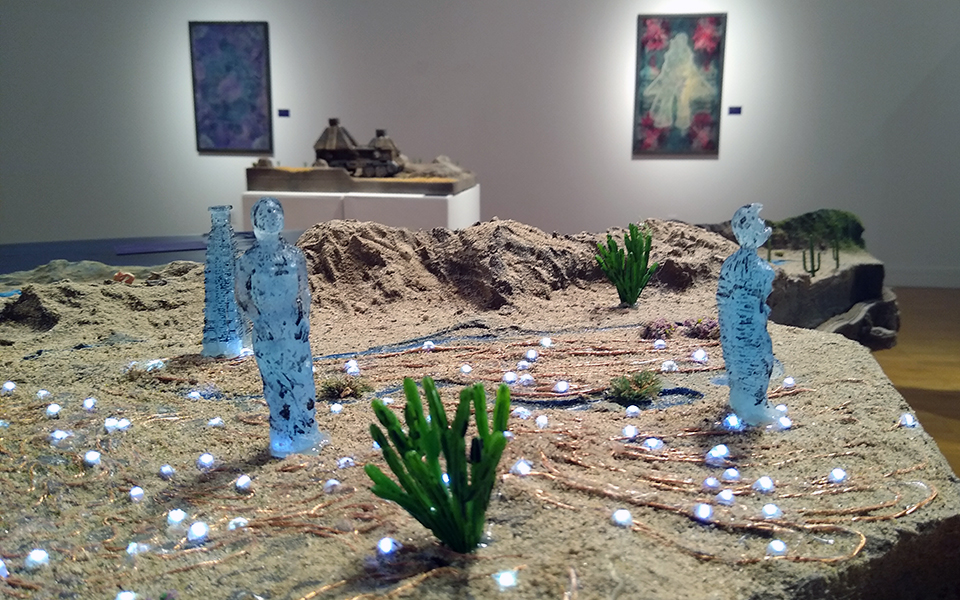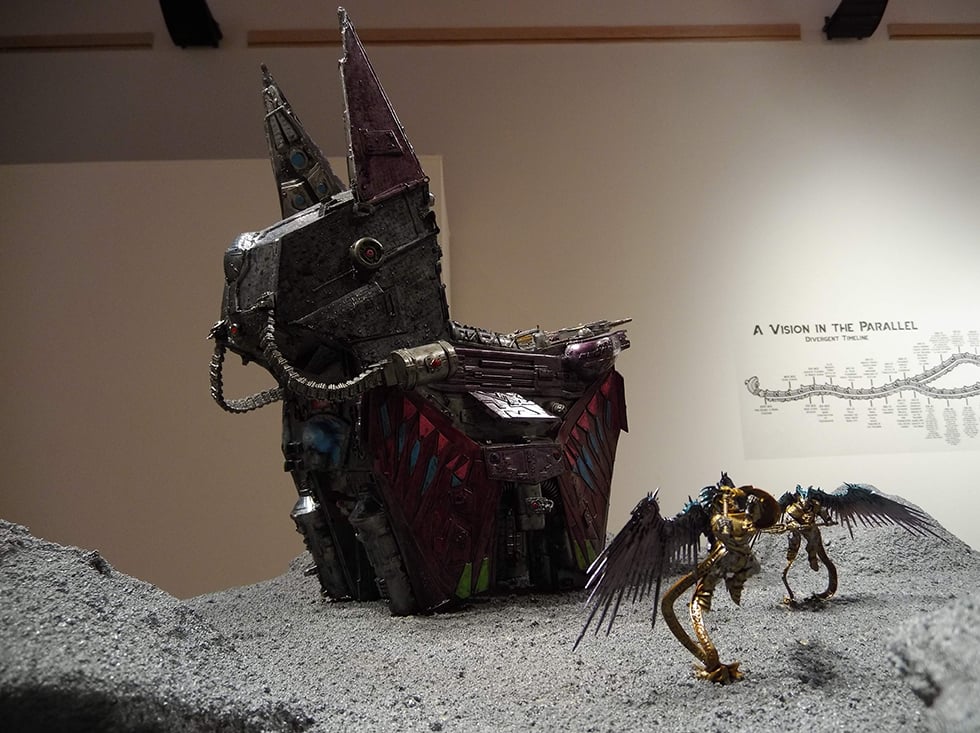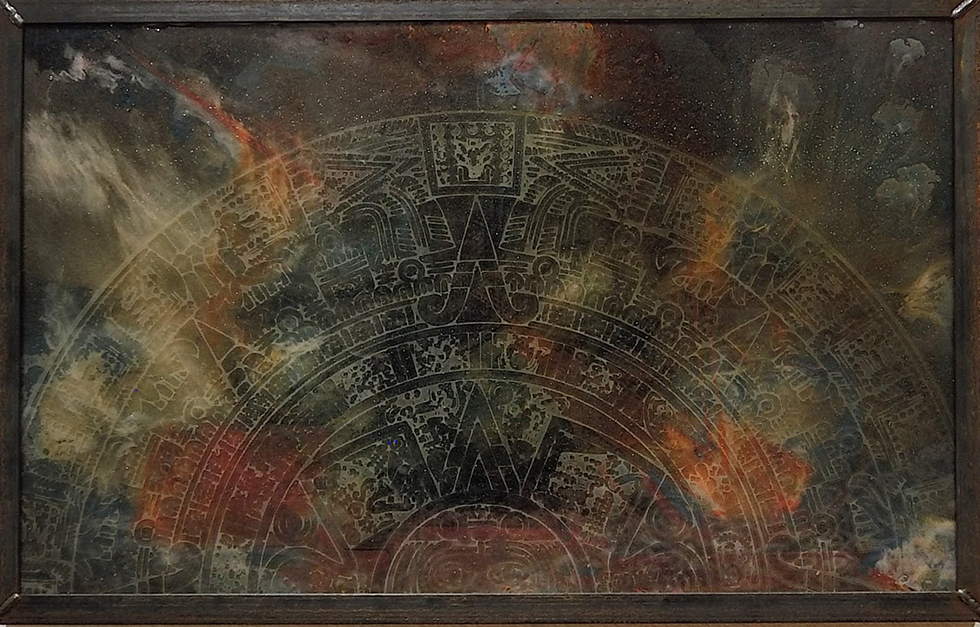Recently, visual art from the Texas-Mexico border has evoked the region’s troubling history. El Paso artist Angel Cabrales has made important contributions to this story. But Cabrales’ new show of sculptures and resin wall hangings, The UnColonized: A Vision in the Parallel, presents a lesson in history not as it happened, but as it might have been.
On display at the Chamizal National Memorial until January 16, the show imagines a forked timeline. This dual chronology—half real history, half artistic license—takes the form of a two-headed serpent printed along one wall of the exhibition. The split occurs around the year 1511, just before conquistador Hernan Cortés arrives in what is now Mexico. Along the upper fork of the timeline, we see Western Hemisphere history as we know it: smallpox, Cortés’ conquest of the Aztecs at Tenochtitlan (today’s Mexico City), Pizarro’s defeat of the Incas, the North and South American colonies, slavery, revolution, world wars, and the U.S. empire.

Along the lower fork of the snaking timeline, however, Cabrales imagines a different story. In 1511, a shipwrecked Spaniard in the Yucatan Peninsula recognizes the smallpox and teaches his Mayan hosts how to quarantine the infected. He also warns of Cortés’ military ambitions. This knowledge travels to Tenochtitlan, and both colonial invaders and plague are held at bay. Soon, the great pre-conquest American empires, the Aztec and Inca, join with Mayans and others to repel the Spanish from the so-called New World. In 1775, a failed American Revolution in the British colonies offers the uncolonized states the opportunity to expel all Europeans from North as well as South America, leading to the formation of the bicontinental United Nations of Anahuac. This rising superpower will eventually cure smallpox, invent the telephone, win World War II, develop solar power as its primary energy source. It also leads the way in space exploration thanks to the deployment of something called La Piñata Cosmica—a cute, shaggy-burro version of a lunar lander, outfitted for long interplanetary voyages of discovery.
Also on display are other culture heroes of the United Nations of Anahuac, including Mayamathematicians, Aztechnonauts, Olmechemists, and Zapoteknical engineers, presented as 3-D action figures or in laser-cut resins reminiscent of stained-glass Catholic saints. There’s a toy-like tank built to resemble the temples of the sun and moon at Teotihuacan, and a blurred version of the Aztec calendar, fading into a galactic smear of light and color. Finally, at the center of the room, a 3-D layout of the land known as Mexico is inhabited by glowing blue sage-like figures and dotted with blue lights suggesting well-ordered futuristic cities and ceremonial sites.

Taken as a whole, this wildly imaginative show evokes childlike wonder, pride in heritage, and sublimated—though never exactly repressed—historical grievance. From Cabrales, one of the pricklier artists to emerge from the borderlands in recent years, this is a revelation. Fans of contemporary art who don’t live in El Paso may know Cabrales for his work “Juegos Fronteras” (“Border Games”), which has showed in Dallas and Austin and will be at South Texas College in McAllen this fall. It’s a series of life-sized playground equipment, including a swing set and slide, built with materials like floodlights and chain link fencing that are reminiscent of border barriers and detention centers. Cabrales created the piece after returning to an area near El Paso where he’d played as a child that has since been annexed into an increasingly militarized border zone. It has been representative of Cabrales’ most recognizable register: dark, sarcastic, and deeply critical.
In “The UnColonized,” though, Cabrales pushes past righteous indignation to a sort of impossible but joyful optimism. He makes this leap of faith via a radical historical disappearing act, scuffing out five centuries of cultural genocide, white supremacy, and colonial fortress mentality. His sheer pleasure in exploring this new imaginative realm—unreal as a nation-state, but achievable as a mind-state—is palpable.

It’s a place that many viewers will want to visit, too. Chamizal National Monument is a small park and history museum in El Paso built to commemorate a 1964 land-transfer treaty between the United States and Mexico. The show will form a centerpiece of the Chamizal’s family-friendly Borderlands Heritage Festival on Saturday, October 26.
Will kids and families dig Cabrales’ radical vision? Very likely, yes. His dream of Anahuac recalls nothing so much as the world of Wakanda in the 2018 film Black Panther. By positing a techno-utopian Latinx future, Cabrales deftly celebrates a very real cultural history of resistance, unity, and unsung contributions to science.
As for the artist’s vision of what lies ahead, it doesn’t feel so impossible. Bicontinental statehood may be off the table, but that’s not what the dream is really about. Cultural expression and pride are what animate Cabrales’ visionary world—and those things are already here, on exhibit in three dimensions, and real enough for any kid who has ever played with action figures. Kids will understand, too, how the game works from here: We invent the rest of the story ourselves.
Get the latest Texas Observer news, analysis, and investigations via our weekly newsletter:
Read more from the Observer:
-
The Creature of Martin Creek Lake Won’t Die: The Martin Lake coal plant in East Texas is the biggest sulfur dioxide polluter in the nation. And unlike other regional super-polluters, this one is still chugging along.
-
The Roots of Narendra Modi’s Divisiveness Are at Odds With the Idea of a Diverse Houston: The “Howdy Modi” event is drawing criticism for welcoming the Indian prime minister amid human rights issues plaguing his country.
-
The Green New Deal Can Exist in Texas: The state has already shown what can be accomplished when renewable energy is prioritized. Now, Texans want to take action. Do lawmakers?








